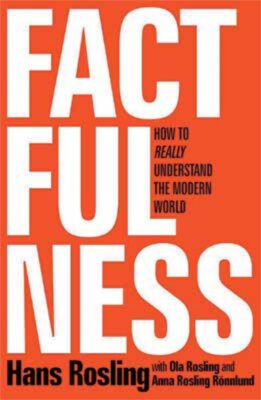Main content
Author: Hans Rosling
Published by: Flatiron Books, 2018
259 pages, € 22.50
In Dutch: Feitenkennis,
published by Unieboek | Het Spectrum

We all know Hans Rosling, the world’s most famous public health professor from the Swedish Karolinska Institute and co-founder of the Gapminder Foundation (see www.gapminder.org). A year after he died in February 2017 at the age of 68, his last work was published, the book FACTFULNESS, which he wrote together with his son Ola and daughter-in-law Anna.
Why a book?
After his very successful TED talks and lectures all around the world, Hans wondered why people are still so ignorant about basic facts of the world. During his worldwide war on ignorance, he was armed with statistics and could explain them in the most appealing ways, for example with the famous bubble charts (Figure 1). However, the more people Hans tested, the more ignorance he found, and this was true in all possible audiences ranging from students to NGO-workers and policy makers. This frustrating and worrying finding was why he wrote this book about why we tend to have a dramatic instead of fact-based worldview. When Hans was diagnosed with cancer, he cancelled all his talks and travels and devoted all his energy to finishing this book.
Why we are biased and how to avoid it
In his typical clear and amusing but serious way, Rosling describes ten unhelpful instincts we all suffer from, which lead to a biased world view. The first is ‘the gap instinct’ – the idea that there is a huge gap between us (the developed, rich world) and them (the developing, poor world). But ‘there is no gap. Today, most people, about 75 percent, live in middle-income countries, not poor and not rich but somewhere in the middle, and starting to live a reasonable life’. Instead of just condemning all of us who often follow our gap instinct, Rosling gives us a way to tackle it by dividing the world into four income levels. People in level I live in extreme poverty (less than 1$ a day); most people live on level 2 or 3, and people on level 4 are rich (more than 64$ a day). This concept of 4 income levels seems a very useful and more accurate way to understand today’s world, and it runs as a common theme throughout the book.
In each chapter, Rosling describes a different instinct that we tend to use when we think about the world, for example the straight-line instinct (the world population is just increasing), the destiny instinct (things have always been this way and will not change) or the blame instinct (there is a clear, simple reason for why something bad has happened). And in each chapter, he brings the good news on how these biases can be attacked by simple rules of thumb. This makes the book so appealing. It helps you realize your own misconceptions about the world, the reasons why they exist and where they come from, and at the same time gives you tools to fight them.
Read or not?
Bill Gates said this was ‘one of the most important books I’ve ever read’. And I fully agree. If you have not done so yet, let this be the next book you read. It is an absolute must-have, an ode to statistics and public health, and a valuable legacy from one of the world’s greatest public health experts.

















































